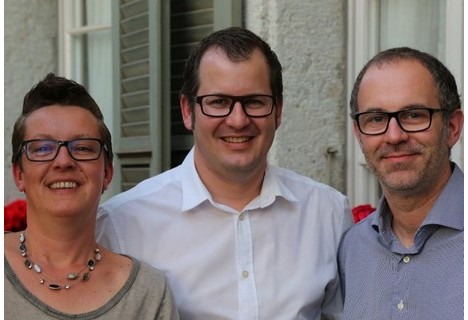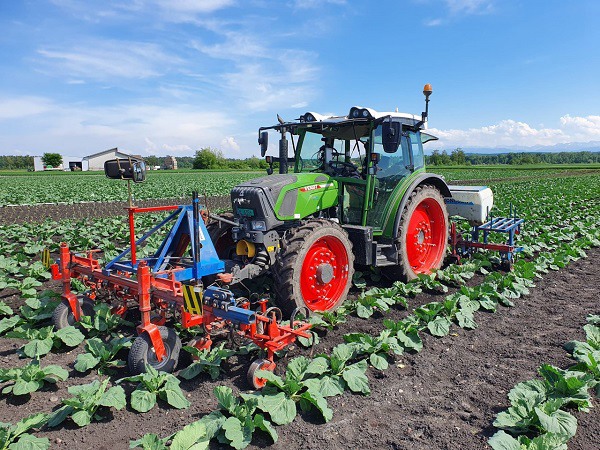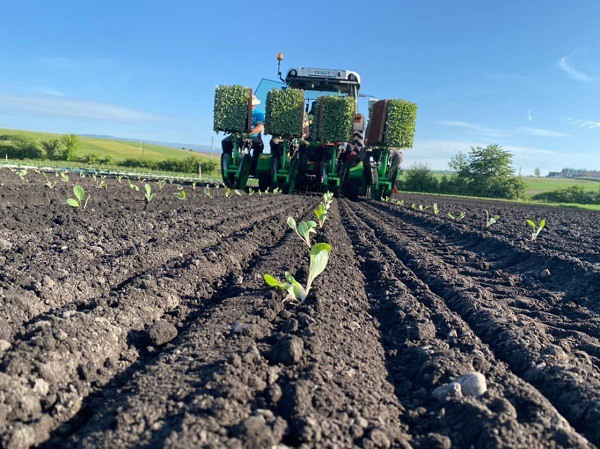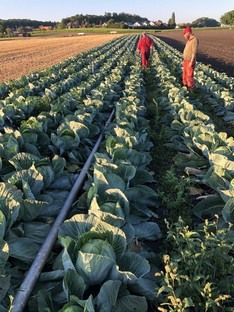Swiss vegetable processors are looking back on a rather challenging sauerkraut campaign. Due to shortages of raw materials, they had to rely in part on white cabbage supplies from Poland, Germany and the Netherlands. Fortunately, the outlook for the new cabbage harvest in the Bernese Lake District is quite positive, David Dreyer says. He is the co-managing director of the family-owned company of the same name, which is one of the largest sauerkraut suppliers in Switzerland.
"Demand has been high and stable throughout the winter season. So if we had had more raw material, it would have been a top season for Swiss sauerkraut," Dreyer adds. However, due to the shortage of raw material, about one third of the white cabbage required had to be imported from other European countries, while the leading sauerkraut specialist normally only needs raw material from the surrounding Seeland and Gürbetal regions.
However, the company said it has only been able to minimally pass through the more difficult procurement situation in the consumer price. "Compared to the year before, we were hardly able to achieve any price increases, which is why we had to bear most of the additional costs and expenses of importing raw materials ourselves," says Dreyer.

Karin, David and Philipp Dreyer are at the helm of the family business in the heart of the Bernese Lake District.
Sauerkraut marketing at a summer low
For sour beets, on the other hand - a rather niche product compared to sauerkraut, which drives sales - the situation was exactly the opposite. Dreyer: "There was enough raw material available throughout the season, but for several years, sales have nevertheless been rather stagnant to slightly declining." For both sauerkraut and sour beets, sales are mainly concentrated in the cold season. "From mid-September onward, demand will slowly pick up, but at the moment we are in the summer low in which we achieve about 10-15 percent of winter sales," Dreyer continues.

Meanwhile, he says preparations for this year's cabbage harvest in the Bernese Lake District are in full swing. "The first early processing crop is expected to be harvested from mid-July, with the main volume then successively hitting the market from August. Due to the freak weather and shortages last year, we have brought planting forward a bit and slightly expanded the acreage. So far, weather conditions have been quite good for cabbage growth. The only thing that is causing some problems for our contract growers is the cost increases throughout the production chain," Dreyer continues.

Sauerkraut still popular
On the sales side, sauerkraut consumption has been boosted, for example thanks to new, modern varieties. The Dreyer company has set itself the task of developing new sauerkraut products with its finger on the pulse of the times. In particular it is trying to get younger buyers excited about the local vegetable. "Fermented vegetables, such as kimchi, are rapidly increasing in popularity. On the other hand, about 95 percent of our total sales are still our basic range, meaning raw sauerkraut and wine sauerkraut."
of developing new sauerkraut products with its finger on the pulse of the times. In particular it is trying to get younger buyers excited about the local vegetable. "Fermented vegetables, such as kimchi, are rapidly increasing in popularity. On the other hand, about 95 percent of our total sales are still our basic range, meaning raw sauerkraut and wine sauerkraut."
During the pandemic, marketing around new products and niches had taken a bit of a back seat; this is now being gradually picked up again, Dreyer confirms. "There are usually regular tastings, for example in the form of food trucks, in which we want to place sauerkraut as a side dish to hot dogs and to the grill, and also vegetarian variants. So we're trying to gradually extend our season into the summer in the future."
Images: Dreyer Inc.
For more information:
David Dreyer
Dreyer AG
Frenschenbergstrasse 7
CH-2575 Gerolfingen
+41 32 396 00 00
verkauf@dreyer-ag.ch
www.dreyer-ag.ch
